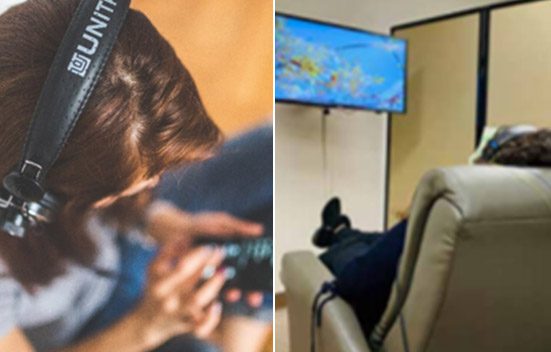WHAT HAPPENS IN THE BRAIN WHEN YOU ARE IN LOVE?
Researchers have scanned the brains of people who are madly in love and found a heavy surge of dopamine, the neurotransmitters of the brain’s reward system that helps people feel pleasure. Dopamine, along with other chemicals, gives us that energy, focus, and obsession we feel when we’re wild about someone.
In 2005, Helen Fisher, a biological anthropologist, led a research team that published a groundbreaking study that included the first functional MRI (fMRI) images of the brains of individuals in the throes of romantic love. They studied 2,500 brains! People looked at photos of people they romantically loved, this caused the participants’ brains to become active in regions rich with dopamine, the feel-good neurotransmitter.
Two of the brain regions that showed activity in the fMRI scans were a region associated with reward detection and expectation and the integration of sensory experiences into social behavior, and the area associated with pleasure-focused attention, and the motivation to pursue and acquire rewards. When we are falling in love, chemicals associated with the reward circuit flood our brain, producing a variety of physical and emotional responses—racing hearts, sweaty palms, flushed cheeks, feelings of passion, and anxiety.
In addition to the positive feelings romance brings, love also deactivates the neural pathway responsible for negative emotions, such as fear and social judgment.
When we are engaged in romantic love, the neural machinery responsible for making critical assessments of other people, including assessments of those with whom we are romantically involved, shuts down. “That’s the neural basis for the ancient wisdom ‘love is blind”, said Richard Schwartz, Harvard Medical School Professor.
WHAT HAPPENS IN THE BRAIN WHEN YOU THINK POSITIVELY
 When positive thoughts are generated, when you’re feeling happy, or optimistic, cortisol decreases and the brain produces serotonin, creating a feeling of well-being.
When positive thoughts are generated, when you’re feeling happy, or optimistic, cortisol decreases and the brain produces serotonin, creating a feeling of well-being.
When serotonin levels are normal, one feels happy, calmer, less anxious, more focused, and more emotionally stable (Scaccia, 2017). Remember, dopamine is also a neurotransmitter that helps control the brain’s reward system and pleasure center. Doesn’t that remind you of what you read at the beginning of this blog?
Daniel Goleman author of “Focus: The Hidden Driver of Excellence” states that the brain has heightened prefrontal activity and positivity resulting in enhanced mental functions such as creative thinking, cognitive flexibility, and even faster processing. Positive emotions widen our span of attention, and it also changes our perception and focuses on more of the “we” instead of the “me” (Goleman, 2013. pg. 170). And we can ask “Isn’t this exactly what we want when working collaboratively with classmates, co-workers, or associates?”
Glass Half-full or Half-empty?
Behavioral scientists have also observed some interesting differences between optimists and pessimists. Besides the fact that optimists are more persevering and successful in life, they also tend to have better physical health. Being optimistic “involves highly desirable cognitive, emotional, and motivational components” (Reynolds, 2011).
Positive Thoughts benefits
- Synapses (areas connecting neurons) increase dynamically
- Increases mental productivity by improving cognition
- Intensifies the ability to pay attention, focus
- Improves ability to think and analyze incoming data
- Improves the ability to solve problems quicker and enhances creativity
Since the prefrontal cortex is the part of the brain that helps you control your emotions and behaviors, it also helps you stay focused. By thinking positive thoughts, you can enhance your higher-order thinking skills as well as analyze and control your cognitive processes, especially when actively engaged in learning.
WHAT HAPPENS IN THE BRAIN WHEN YOU PERFORM ACTS OF KINDNESS
The warm feeling of well-being that washes over you when you’ve done something kind isn’t just in your head. It’s in your brain chemicals, too.
Most research on the science behind why kindness makes us feel better has centered around oxytocin. Oxytocin “the love hormone,” plays a role in forming social bonds and trusting other people.
Acts of kindness can also give our love hormone levels a boost; research suggests.
Dr. IsHak, professor of psychiatry at Cedars-Sinai, says studies have also linked random acts of kindness to releasing dopamine, a chemical messenger in the brain that can give us a feeling of euphoria. This feel-good brain chemical is credited with causing what’s known as a “helper’s high.”
In addition to boosting oxytocin and dopamine, being kind can also increase serotonin, remember this is the neurotransmitter that helps regulate your mood.
The good news is that a simple act of kindness can reward our bodies and minds with feel-good chemical substances. However, the effect won’t last. A single act of kindness isn’t going to carry you through several days—or even hours. “The trick you need to know: Acts of kindness have to be repeated,” Dr. IsHak says.
Helping others is also believed to increase levels of an endorphin-like chemical in the body called substance P, which can relieve pain, Dr. IsHak says.
Neurofeedback is becoming increasingly popular for treating anxiety, depression, and other mental health conditions. It is not a therapy, it is following your brain waves live, micro-second by micro-second to help your brain rewire itself and increase the positive and feelgood centers in your brain. The good news is that after a certain number of neurofeedback sessions results are lasting! At InnerOptimal, we will evaluate where you are at, the program, and the number of sessions you need to achieve your goals. Our coaching sessions help you journal and witness the increase in your gratitude, and acts of kindness. Our clients testify that they incorporate acts of kindness, as well as becoming more prevenient, into their daily routines.
HOW RELATIONSHIPS HELP KEEP THE BRAIN YOUNG
Having a vibrant social life may protect your brain as you age, according to a new report from AARP’s Global Council on Brain Health. The council’s review of the data shows that having close ties to friends and family, as well as participating in meaningful social activities, may help keep  your mind sharp and your memories strong.
your mind sharp and your memories strong.
“Spending time with friends and family is surprisingly important to brain health as we age,” says Sarah Lock, the council’s executive director, and AARP senior vice president. “And it’s not just the number of social connections you have. The type, quality, and purpose of your relationships can affect your brain functions, as well.”
Adults who are happy with their friends and social activities are more likely to report an increase in their memory and thinking skills, while those who are unsatisfied with their social lives report that their cognitive abilities have declined.
Experts say interacting with others in meaningful ways may provide a buffer against the harmful effects of stress on the brain.
Research also supports the idea that helping others makes a difference in cognitive health. One long-running study led by Carlson has found that regular volunteering can reverse declines in brain volume.
With Neurofeedback you will unlock your brain that was previously locked with unsuccessful or even traumatic experiences in relationships! Lots of our single clients, once their program is done, experience attracting the right person more easily. All of them attract quality friends who are happy to be around, and harmony is in their life, family, and friends. What best can we wish with relationships?
WHAT HAPPENS INSIDE YOUR BRAIN?
Your brain constantly communicates within its different parts, receiving information and responding to them. The problem is that life events create blocks, and communication (inside the brain and outside) becomes blocked or poor!
When communication inside your brain is blocked or poor, relationships with others are messed up, because your brain tends to mull over things and makes you feel miserable.
There are six different areas in your brain related to the way you see the world, you react to the world, which impacts your mood and decisions. To make things easier let’s just look at the three main parts of your brain.
– The Neo-cortex is responsible for insight, inspiration, intuition, and the purpose of life, it’s the thinking part of our brain, and it is the part that makes us human. When this Neo-cortex can be the director of the other parts you can easily change your angry thoughts to happy ones, and you can reinforce the happy centers of your brain, so you feel happy and blessed!
– The Reptilian is also called the survival part of your brain. Unfortunately, it’s too often this part that is too active! This is the result of traumas, hurts, loss, or when we push ourselves too much for too long, which is the tendency in our modern society! When the reptilian is the most active, your first thoughts are always negative, then concerns, doubts, fears, worries, and frustrations are consuming a big part of your mental energy, and you tend to mull things over. You need an active Neo-cortex to revert this tendency to a harmonious one. But in that case, all the activity comes first from the reptilian, and to revert this tendency is extremely difficult and sometimes quite impossible if the brain has lost its homeostasis, which is its ability to heal itself and self-regulate. You need the help of an expert. Neurofeedback brain training is extremely efficient, it is truly life-changing with lasting results.
– The Limbic part also plays an important role in a relationship because it is related to our social interactions. Like any other part of your brain, it needs to be at the right percentage of activity, not too active otherwise you can become dependent on others’ decisions and opinions for lack of self-confidence or numb to others’ feelings when it is the other extreme of activity percentage. It’s the part of your brain with the Neocortex that can be easily damaged by blows to the head. And these blows can be recent or have happened when you were doing lots of sport young. The concussion won’t heal on its own! Here again, we can help!
As we see, we need harmonious communication between the different parts of our brain to be happy, be lucky, and feel blessed, and then we can influence others to be the same. This is what neurofeedback sessions will help your brain to become.
Neurofeedback will help your brain to shrink the negative parts of your mind and to grow the happy ones!
Do you have questions, or need precisions, do not hesitate to contact us, we are here to help!
HAPPY MONTH OF LOVE, AND HAPPY VALENTINE’S DAY!
Dr. Danielle, Marie-Laure, and their team.





